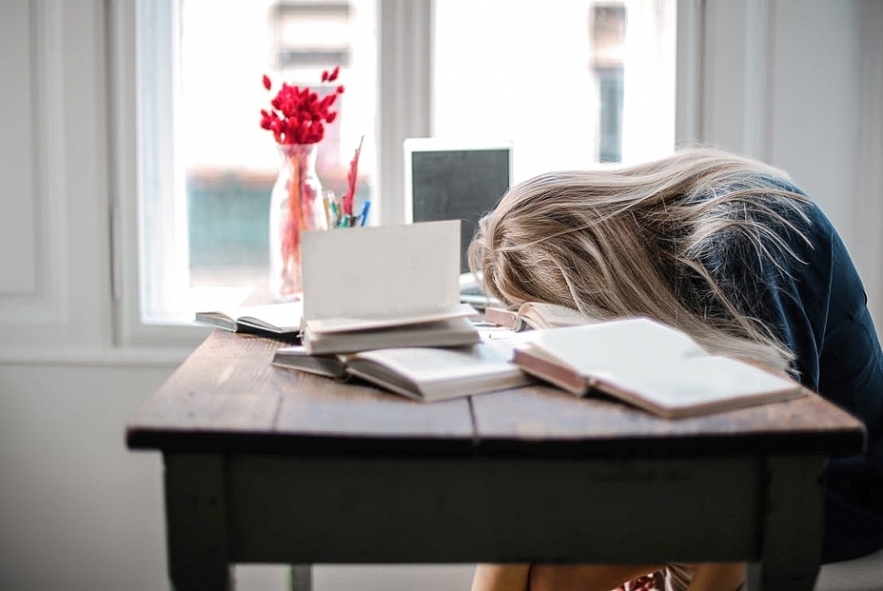Why Do I Wake Up Tired?
 |
| Wake Up Tired, Why? |
Tiredness is a familiar sensation that appears more frequently than we would like. During the day, we do not stop doing activities, so it is so important that the hours we dedicate to rest are functional and adequate.
Thus, it is not enough to sleep. But we must ensure that the way we do it is adequate. The sleep cycle goes through different phases, some of which are more important to achieve proper brain rest. We will have to consider other variables such as possible mental pathologies, mood disorders or sleep-wake disorders, or external factors that also influence the subject, such as the environment in which he/she sleeps (temperature, noise, comfort, etc.).
It is also essential to have a good daily routine to get more rest, eat healthily, practice sports (avoiding the hours before going to sleep), and reduce the degree of stress and anxiety, especially before going to bed.
This article will discuss the importance of resting well, both physically and mentally, and what variables can lead to poor rest and, therefore, a greater feeling of tiredness. We also recommend another helpful article about 7 tips to help students feel better about their mental health.
The importance of a well sleeping:
Sleep is a basic or primary need that is essential for our survival. If we do not rest, we die. It's as simple as that. Sleep allows the brain to recover from daily functioning, thus ensuring a better performance the next day.
Also, rest, apart from the body and brain recovery function, allows us to consolidate some cognitive functions such as memory, which is thus necessary for the learning process. It is recommended to sleep between 7 to 8 hours a day. Sleep consists of 5 different phases. The phases where the brain rests and recovers the most are in phase 3, especially in phase 4, being phase 5, the phase where the consolidation of learning takes place.
Thus, even if we sleep the correct hours, the presentation of the different phases may not be accurate. For example, if phases 1 and 2 predominate, sleep will be lighter, and the brain will not be able to recover fully. For this reason, we must pay attention to our sleeping behavior to ensure that it is correct.
The causes behind constantly waking up tired:
Now that we know the importance of a good rest, we will cite what may be the reasons that derive a bad sleep behavior from a bad rest. It is essential to know the causes to be able to intervene and improve the condition of the subject since a bad rest ends up having repercussions and affecting its functionality.
-
Insomnia
Insomnia is a disorder of sleep and wakefulness that involves difficulty initiating or maintaining sleep or waking up earlier than desired and not being able to go back to sleep. This is the most prevalent type of sleep disorder, increasing with age and occurring more frequently in women. To be diagnosed as a sleep disorder, the criteria must be met 3 nights a week for 3 months, according to the fifth edition of the Diagnostic Manual of the American Psychiatric Association (DSM 5).
-
Hypersomnia
Another mental disorder linked to the alteration in the sleep-wake cycle is hypersomnia, which consists of excessive sleepiness that occurs despite adequate rest (minimum 7 hours). The subject reports that sleep is not restful even though he sleeps 9 hours or more, falls asleep during the day, and finds it difficult to become fully active after a sudden awakening. In this case, it is also necessary that the symptoms occur at least 3 times per week for 3 months.
-
Other sleep disorders
Another disorder also related to sleep is narcolepsy, which involves an intense need to sleep. The subject takes naps during the day or has a breathing-related sleep disorder. Respiratory disorders such as apneas or hypoventilation are observed in a deficit or impact on rest.
-
Poor sleep hygiene
By sleep hygiene, we refer to the behaviors we perform before sleeping. For a good rest or greater ease of sleep, it helps to perform specific activities so that our body relaxes.
Behaviors to avoid:
- Watching television or looking at the cell phone just before going to sleep
- Eating a lot of dinners
- Playing sports during the hours before bedtime
Behaviors to enhance or implement:
- Drinking a glass of milk before going to sleep.
- Reading a little before turning off the light.
- Establishing a routine that we follow daily so that our body gets used to it makes it easier for us to relax.
-
Bad daily routine
Bad habits during the day also make it challenging to achieve a good rest. For example, not doing sports, eating poorly (unhealthy food), or having a very frenetic pace with constant stress and anxiety impacts getting a good rest. Many factors, including studying, can cause stress. In this case, it is essential to optimize the learning process so that it does not bring negative emotions. For example, you can use a paper writing service when you feel overloaded with assignments or study selectively only those topics that interest you.
-
Substance and pills consumption
The consumption of drugs also affects getting a good sleep process. There are stimulant drugs such as cocaine that hinder rest. Still, even the obvious ones that function as tranquilizers, such as alcohol, affect the proper development of sleep and achieve a good sleep-wake cycle. Likewise, other addictive substances such as coffee also alter the sleep cycle and make it difficult for sleep to proceed normally, as expected.
Some drugs can affect the correct process of rest. Even those used to facilitate sleep can show side effects that increase our feeling of daytime fatigue. To combat insomnia, benzodiazepines are prescribed that act as depressants of the organism, thus facilitating sleep. Still, it has been observed that those of long duration can cause symptoms of tiredness during the day since the tranquilizing effects last longer than desired.
-
Inadequate environmental stimuli
Apart from the routine we perform before going to sleep. It is necessary to control the environmental stimuli, the stimuli of our room where we sleep, to get better rest. Thus, we should check that the temperature is adequate, that it is neither too cold nor too hot, that the bed and pillow are comfortable, and that there are no distracting noises or lights that may disturb us.
It is also recommended not to associate the bed with activities other than sleeping. Thus, we will avoid studying in bed, watching television from bed, or spending a long time awake in bed without falling asleep.
-
Mood disorders
Mood disorders such as depression or persistent depressive disorder (formerly known as dysthymia) can be linked to sleep behavioral disturbances. The subject is more tired and less energetic to face the day. One of the symptoms cited as possible is the presence of hypersomnia or insomnia, alterations that we have already mentioned as a sleep disorder and which lead to a greater feeling of tiredness.
-
Asthenia
Asthenia is the medical name given to the constant feeling of tiredness. The subject feels continually tired, with muscular weakness, more sluggish, and without the strength to perform activities that he/she used to do without any problem. The causes can be linked to organic affections such as anemia (low levels of red blood cells) or infections or to psychological preferences such as major depressive disorder, sleep disorder, or excessive activation, and being subjected to high daily stress.
-
Lack of melatonin and tryptophan
Melatonin is a hormone produced by the pineal gland, located in the brain, which is linked to the process of regulating the sleep-wake cycle. When the function of melatonin is correct, it is produced at higher levels at night when the environment in which the subject is located is dark. Low production of melatonin levels can lead to or facilitate sleep disorders, such as insomnia.
A low level of tryptophan can also lead to sleep-related problems and thus to a greater feeling of tiredness. The pineal gland mentioned above produces melatonin, which regulates our internal biological clock, from serotonin, another hormone that comes from the essential amino acid tryptophan.
We hope that with the help of this article, you will understand a little more about what causes your fatigue after sleep. We wish you a good night's sleep and feel great and energetic!
 6 Things to Do When Wake Up to be Healthy and Refreshed All Day 6 Things to Do When Wake Up to be Healthy and Refreshed All Day As long as you do this correctly, you can lose a little weight every day and your health will also improve. |
 Tricks and Tips to Wake up Early every morning Tricks and Tips to Wake up Early every morning You often feel that it is very difficult to wake up early each morning, don't you? You want to change it quickly but don't know ... |























